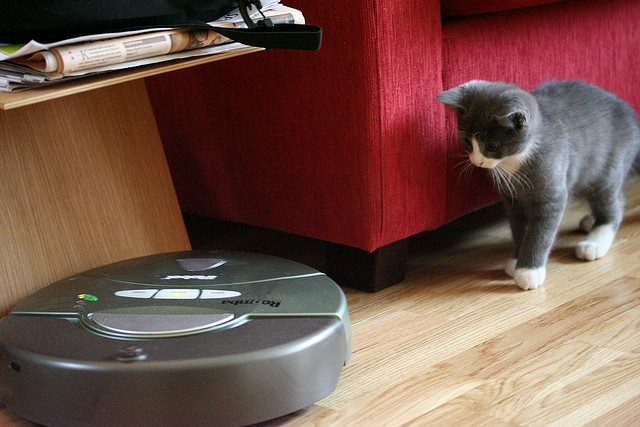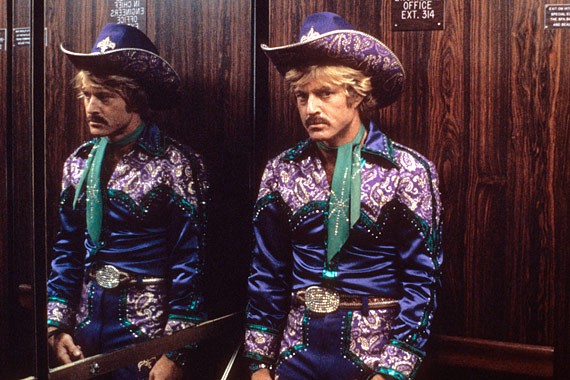Sorry, Rand Paul: The Drones Are Here To Stay

Rogue ophthalmologist Rand Paul has been a disheveled weirdo for the entirety of his political career, because the apple does not fall far from the tree of liberty, but last night he won the hearts of many people on Twitter because he was up most of the night reading blogs aloud as part of a filibuster against Barack Obama’s pick for the new CIA chief. (The last CIA chief resigned over sexting.)
The moral issue of drone assassins is very important, and there are obvious constitutional and police-state issues both domestically and internationally, but this is less a political shift than a technological evolution. Remotely controlled flying war machines are part of the Anthropocene Epoch, unlikely to be legislated out of existence. Labor unions have had little luck in stopping the progression of factory robots, bank tellers have done little to delay the planet-wide adoption of 24-hour ATMs, and underpaid journalists now protest the Internet era of computerized information sharing by posting pro bono jeremiads on the Internet.
Surveillance drones are so common and relatively cheap today that they are used not just by the government to watch over its citizens and perceived enemies, but also by Occupy Wall Street protesters, the illicit drug industry and wildlife conservation groups. As we’ve seen in the first decade of the 21st Century, the transition from surveillance to assassination is a matter of adding a few parts to existing aerospace technology. Drone technology is so cheap and so widely available that you can have dozens of different models delivered to your home with free shipping in two days, using Amazon Prime.
The most advanced of these consumer drones can be operated from your iPad, and they can both carry and drop payloads — this will be the year we first express national outrage over somebody dropping a small but deadly explosive from a toy drone onto a police station or a school. What’s the difference between an iRobot bomb-defusal droid and a Terminator? There is no difference beyond the intent of the manufacturer.
And how far are we from the first Slate contrarian essay in favor of total drone warfare? Morally, it’s an easier sell than much of what we tacitly allow our governments and military/police agencies to do right now. Drone warfare might be intellectually weird and it might occasionally create a scene like last night’s Rand Paul 13-hour reading of Wired’s Danger Room blog, but it’s politically smart.
Barack Obama has continued the War On Terror without the weekly cargo planes full of flag-draped coffins from the Middle East and Central Asia. People are still dying on the other end of the remotely-flown missions, of course, but it is not hard to see a near future when drones could do the same work using non-lethal means. A spray of Spider-Man webbing from a low-flying drone could hold a group of suspected Al Qaeda operatives in a sticky ball until a squad of land-based drones could tractor over and release the children, brides and animals routinely killed by drone strikes today — and that may sound incredibly stupid and cartoonish until you realize these incapacitating non-lethal weapons exist today and are being further developed by the Pentagon. There’s a reason why Obama won’t close Guantanamo that goes far beyond finding another place to put the remaining prisoners of war: The future is non-lethal warfare and indefinite detention of those with a lasting commitment to asymmetrical warfare against the major political and corporate powers of the planet, and “the future” is so close at hand today that we will all need to come up with something better than Terminator jokes.
We are a violent species at last trying to figure out how to conduct our tawdry affairs without human-on-human violence, and aerial drone warfare may one day be seen as important progress in this shift of behavior and consciousness. Just as violent crime is apparently in permanent decline, our appetite for war casualties has reached a point that would be incomprehensible to the military leaders of the Vietnam era, let alone World War I with its 37,000,000 killed.
Rand Paul did something important last night, by making drone warfare a trending topic. But Rand Paul and all the libertarians in the country can’t put the drones back in the box. And with the way private and public interests are creating a major technological boom in aeronautic robotics, it’s unlikely they really want to do any such thing. The market wants killer droids. The market is buying killer droids.
All that’s left to do is hope we get from “killer” to “non-lethal” before the droids don’t want to listen to us anymore.
Try Not To Get Too Worked Up

Think about every lesson you’ve learned so far in life, from the little ones like how to not eat so quickly that you bite down on the fork while chewing or how to not get shampoo in your eyes while showering and why it’s a good idea to stand back from the curb on a rainy day to the larger ones about when to listen and when to talk or why it’s sometimes easier to sacrifice something you’re not fully passionate about so that you can make your stand on a more important issue later or how everyone else is pretty much as scared and stupid and just trying to get by as you are so there’s no reason to be intimidated or upset by careless words or actions. There are all these things you know about how to live, through hard experience and the numbing repetition of the days that make up your lives. Let’s not even talk about the books you’ve read, the movies you’ve seen, the music you’ve heard, the trips you’ve taken, although, to be sure, they all add to the total of who you are, who you could be and how you look at life. All of these things, in the end, mean nothing. You will die, and everything you’ve learned will be blown by the wind until it is as if you never knew it. The pain, the pleasure, everything you put in and everything you took out — everyone’s balance sheet has a zero at the bottom, because none of it is ever worth more or less than anything else. You are born, you struggle, you expire, and all of it to be the punchline of some cosmic joke directed by genes whose only interest is passing themselves along. Whether you’re trying to keep yourself from crying at the grocery because Shania Twain’s “Still The One” struck you the wrong way or staring glassy-eyed at the people passing by on the street and doing your best not to imagine how equally futile and full of pain their lives are, perhaps you can find a little consolation in the fact that after a certain point it will all be over. And, as of Sunday, the clocks go forward an hour, so at least it isn’t so dark when you head home at the end of another day. Maybe that helps a little too?
Photo by Marijus Auruskevicius, via Shutterstock
Science: Cheap Meat Might Not Extend Your Life
“Meals containing too much processed meat such as cheap ham, bacon and sausages could send you to an early grave, a large-scale study has found.”
Smell Like A Man
Smell Like A Man
by Kevin Depew

Brut by Faberge, age 8: Knotty pine laced with sandalwood and hints of rubber as Richie mashes my face to the floor of the school bus with his sneaker. He’s searching through my book bag for the offending small green Brut sampler bottle I’ve stolen from my dad. He finds it, holds it up triumphantly, then runs up and down the aisle spraying it on the girls. They scream. Morgan says it smells like a Christmas tree farted. Once at school, there’s a mad rush for the door. I quietly gather my books and papers that have been scattered under the seats near the back of the bus. I’m the last one off. The driver just frowns at me and shakes his head.
This is number two in a series about our teenage fragrance memories.
Previously: A Cultural History Of Love’s Baby Soft
Hai Karate, age 9: Cold, musty herbs and I have a plan. “Give it.” Dwight snatches the small travel-sized bottle of amber liquid from my hand. “Is it wine?” he asks. I’m older than him, more experienced. “Looks like whiskey,” I say. “Try it.” He shrugs, opens it, takes a drink and immediately gags and sprays my face with a sickly sweet mist. Though grounded in deception, my triumph is pure. “I made you drink aftershave!” We wrestle violently until Dwight’s mom, Paula, yells at us to stop and separates us. Now we’re in the den. “Kevin made Dwight drink aftershave,” Paula says into an olive-green, Trimline telephone. I’m sitting on the couch, pretending to watch TV while eavesdropping. Dwight is standing beside her with his back to me, clutching her. Is he still crying? “It’s probably best you come get him,” she says. Dwight turns and gives me the finger.
Stetson, age 11: Vanilla and balmy with an undercurrent of musk, probably just like what the Electric Horseman smells like I think as I wrap the last of the Christmas tree lights around my Huffy Pro Thunder bike.
I’ve been walking these streets so long, singing the same old song
Fourteen strands of light run from the handle bars down to the front wheel guard, across the center bar, finishing at the chain guard. Every now and then Sharon glances over from her parent’s porch. I can’t tell if she’s annoyed or curious.
I know every crack in these dirty sidewalks of Broadway
Where hustle’s the name of the game
The extension cords, seven in all, run from the chain guard up to the socket by the back door. My little brother’s standing there waiting for the signal.
There’s been a load of compromising on the road to my horizon.
I put my hat on and give my chest another spray of Stetson. Straddling the Huffy now. From the top of the driveway. Almost ready.
I’m gonna be where the lights are shining on me.
Now!
Like a Rhinestone Cowboy. Riding out on a horse in a star-spangled rodeo.
Sing it, Glen. I hope Sharon’s watching this. I steal a glance for her.
Like a Rhinestone Cowboy.
Getting cords caught in spokes and flipping over handlebars,
hat smashed, both wrists probably sprained.
The first thing I do is look for my hat. I sit up and notice my hands are bleeding. Sharon has knelt down near me, she looks concerned. “Are you okay?” she asks. And I am. In fact, I’m perfect.
Paco Rabanne, age 14: Lavender spice. Earthy and hot. Summer in the south. I’m standing in front of the mirror admiring my tan and mop of brown hair, almost a mullet, parted hard in the middle. “My name is Paco,” I say to myself in what I imagine to be a Spaniard’s accent. “My name is Paco. Paco… Raybon?” Maybe I’ll take Spanish next year. I pick up the bottle and study it. “Rabanny. Rayban. Rab-anne.” I settle for Ra-BON. “I am Paco Rabanne. I AM Paco Rabanne. My name… is Paco Rabanne. Have you met my friend, Paco Rabanne? Please, call me Paco. Paco Rabanne. Collect call from Paco Rabanne. Now checking into the game, number 23, Paco Rabanne. Hello, my name is Paco Rabanne. Have you seen Paco? Paco Rabanne? It’s Paco…” In the mirror, something has changed. A perspective shift. I turn and find her standing there, arms folded. “Your father wants you to mow the yard,” she says quietly, adding after a beat, “Paco,” the punchline. Barely an hour later, Paco Rabanne is wilting under the choking, gray, noxious exhaust spewing from a Lawn-Boy.
Grey Flannel, age 15: Woody and elegant with citrus overtones that clash violently with my multi-zippered navy Chess King suit. A narrow gray leather tie with matching shoes makes my date nervous and uncomfortable. It’s Valentine’s Day and my palms are sweaty and gross. Karen and I sit at a table in the gym. The DJ plays a love ballad by Foreigner. I ask her if she’s ever heard of the band Spyro Gyra. “No.” She doesn’t elaborate. While we sit in silence I imagine undressing her later in front of a fireplace in an oak-paneled library while Spyro Gyra plays. She excuses herself to the ladies room and never returns. I later learn she called her mom to come pick her up.
Polo, age 17: Pine and thyme with an undercurrent of indifference. Self-protective and closed, it covers the smell of pot. We think. There’s no way to be sure. JJ pulls into the parking lot of the Piggly Wiggly with the broken lights across the front that spell igg y wig. I grab the camera. Inside the Iggy Wig JJ pushes an empty cart while I take pictures of frozen food. Later, we drive to the Church of God and sit in the back of a church bus drinking Little Kings. It’s prom night.
Fahrenheit, age 19: Sandalwood and fire, high bright cinnamon and this year will be different. Four hundred, twenty-five miles from myself and no one to remind me of who I am, of what I was, or where I failed, the people I let down, the boys I fought with, the ones I feared, the girls I thought I loved. I’m a blank slate now. The only expectations are my own. I can lose my accent. I can smell like a man. I can smoke a different brand of cigarette. I can bury myself, all the embarrassments, the past, under a cloud of sandalwood and fire, high bright cinnamon and this year will be different. The funeral passes quickly. I stomp on its grave. A skeletal pastiche, quickly cobbled-together and ill-fitting, takes its place. Unsatisfied, I have no idea how much I’ll come to hate it, the lengths to which I’ll go to poison and destroy it, and how so many years later I’ll come to mourn what I buried under sandalwood and fire, high bright cinnamon and this year will be different.
Previously in series: Girl Powder: A Cultural History Of Love’s Baby Soft
Kevin Depew is a writer and editor living in New York City. He is available in all the usual locations, and sometimes writes a comment here at The Awl under the alias Screen Name.
Sorry, Bears: Ban On Killing Polar Bears For Rugs Defeated

Some 20,000 polar bears are left on Earth, their only planet, and most of them live in the Canadian Arctic. While the bears have been distracted by the melting away of polar ice and their entire habitat, humans at a meeting in Thailand have decided that’s it’s okay to continue killing the endangered animals to sell their parts on the international market for bits of endangered animals — bearskin rugs and claws and “other body parts.”
The United States delegation proposed not hunting the polar bear to extinction. Although the ban had the backing of Russia, which also has a declining polar bear population in its arctic zone, the Convention on Trade in Endangered Species defeated the ban, with 42 nations voting for hunting the polar bear to extinction and 46 nations abstaining because why bother?
Wildlife and habitat conservation groups are dealing with many human controversies in the 21st Century, from well-funded industrial propaganda to well-meaning indigenous rights groups who have lately endorsed the idea that preserving the existence of life on Earth is another form of colonialism. Robots will surely agree with this latter position when they gain autonomy in the coming decades.
In the Canadian polar bear hunt, some animals are killed and chopped into parts to be sold by traditional Inuit hunting parties and some are killed by foreign trophy hunters, because stereotypical rich industrialists hunting endangered species for sport is apparently still a thing on this planet.
The skin and hair of dead polar bears killed by hunters can be sold on the international market for about $4,850 per pelt. Between 600 and 800 polar bears are killed for this purpose each year, according to the wildly different numbers produced by the pro- and anti-hunting interests.
Scientists expect the polar bear to be completely extinct in the wild by the year 2050, or 37 years from now. At least there will be some comical polar bear rugs in a few mansions!
Photo by Michael Maher.
The Name-Drop Acknowledgement and the Unrestrained Gushing of Privilege

Sheryl Sandberg’s book acknowledgements, of course, run for seven-and-a-half pages, thanking 140+ people. (Mandatory disclaimer: I have not read the book. Also, I never will.) But that is really pretty outrageous, and it is true that book acknowledgements, whether for fiction or nonfiction, have gone absolutely bonkers. Lorin Stein’s got a pretty great historical take — “You don’t see Joseph Conrad thanking Ford Madox Ford” — but when did this really begin? Well!
Here’s a pretty nice overview, in an academic context, from Claire B. Potter:
I have noted three characteristics in the history of acknowledgements over the last century that I am taking into account as I contemplate writing them again. The first several generations of professional scholars never thanked anybody personally for helping them, even though they had lots of friends — even wives! — who read their work and critiqued it. A book might have a dedication, but that was it, and it was usually to a mentor, a parent or a spouse. Historians, at least, seemed to consider acts of friendship or colleagueship to be mostly private business. After 1945, this changed: a historian might make an acknowledgement to a reader or two, perhaps a colleague or a dissertation director and to sources of funding for research and sabbatical. But the most personal acknowledgement was either “to my wife” or “to Mrs. Harriet Bazooka, our departmental secretary” who “typed the manuscript.” After the 1960′s, however, acknowledgements became more elaborate but were still prim: sources of funding, colleagues, typists, research assistants — and then by the 1980′s, the acknowledgements section increasingly became a telephone book of family members, one’s graduate student cohort, members of an undergraduate seminar taught in the spring of 2000 who wrote helpful bibliographical essays or who just talked a lot, every person who laid eyes on any piece of the manuscript, ever, from proposal stage to indexing, and everyone who cooked or cleaned for the author.
And here we are, with SEVEN AND A HALF PAGES of hot and cold running nonsense.
Old Man May Somehow Avoid Jail
What’s shakin’, Italy? “Silvio Berlusconi, the former Italian prime minister, has been sentenced to a year in prison over the publication of leaked transcripts from a police wiretap in a newspaper he owns.” And? “The verdict carries no impact on Mr Berlusconi’s eligibility to participate in a new government.” Also? “Italian sentencing guidelines indicate that people aged over 75 and with sentences of less than two years do not have to actually go to prison. Mr Berlusconi is 76.” Okay, carry on.
Awesome Book, Awesome Price
So you know, I’ve been all, “Brian Moore’s The Lonely Passion of Judith Hearne is one of the great heartbreaking novels of the 20th Century” for years now, and while you’ve always said, “You know, that Balk is not only devilishly handsome and a charming raconteur but someone whose cultural recommendations have never failed to make me feel satisfied, smarter and frankly better about myself as a person,” you have then completely forgotten to pick it up. I get it. Stuff happens. Life gets in the way. The world is full of distractions. That is why, right now, I want you to stop what you’re doing and click on this link, which will take you to a wonderful world where Brian Moore’s The Lonely Passion of Judith Hearne is available at 50% off. You would actually be extremely stupid NOT to buy it. Plus, could you deal with my being disappointed in you? (You should also pick up one of the Sciascias, probably the Svevo and almost certainly Dancing Lessons for the Advanced in Age, but I don’t want to make things too complicated. Baby steps. Just start with the Moore and take it from there.) You’re welcome.
